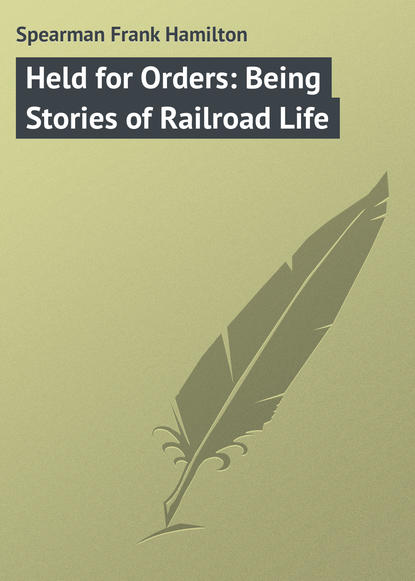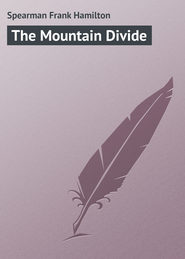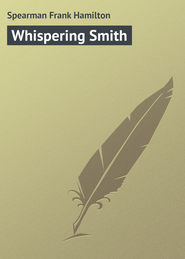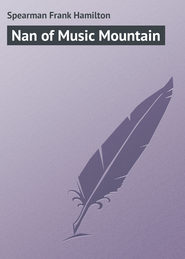По всем вопросам обращайтесь на: info@litportal.ru
(©) 2003-2024.
✖
Held for Orders: Being Stories of Railroad Life
Настройки чтения
Размер шрифта
Высота строк
Поля
"What's the use," he went on slowly. "How can I take charge of conductors, talk to conductors? How can I discharge a conductor for stealing when he knows I'm a thief myself? They know it; Bucks knows it. There's no place among men for a thief."
"Dave, you take it too hard; everything ran wide open here. You're the best railroad man on this division; everybody, old and new, admits that."
"I ought to be a railroad man. I held down a division on the Pan Handle when I was thirty years old."
"Were you a railroad superintendent at thirty?"
"I was a trainmaster at twenty-seven. I'm forty-nine now, and a thief. The woman that ditched me is dead: the man she ran away with is dead: my baby is dead, long ago." He was looking out, as he spoke, on the flying desert ashen in the moonlight. In the car the passengers were hard asleep and we heard only the slew of the straining flanges and the muffled beat of the heavy truck under us.
"There's no law on earth that will keep a man from leaving the track once in a while," I argued; "there's none to keep him from righting his trucks when the chance is offered. I say, a man's bound to do it. If you won't do it here, choose your place and I'll go with you. This is a big country, Dave. Hang it, I'll go anywhere. You are my partner, aren't you?"
He bent to pick up his lantern, "Tommie, you're a great boy."
"Well, I mean it." He looked at his watch, I pulled mine: it was one o'clock.
"Better go to sleep, Tommie." I looked up into his face as he rose. He looked for an instant steadily into mine. "Go to bed, Tommie," he smiled, pulling down his visor, and turning, he walked slowly forward. I threw myself on the couch and drew my cap over my eyes. The first thing I felt was a hand on my shoulder. Then I realized I had been asleep and that the train was standing still. A man was bending over me, lantern in hand. It was the porter.
"What's wrong?" I exclaimed.
"There's trouble up ahead, Mr. Burnes," he exclaimed huskily. I sprang to my feet. "Have you got your pistol?" he stuttered.
Somebody came running down the aisle and the porter dodged like a hare behind me. It was the hind-end brakeman, but he was so scared he could not speak. I hurried forward.
Through the head Los Angeles sleeper, the San Francisco cars and the Portland I ran without meeting a living soul; but the silence was ominous. When I caught a glimpse of the inside of the chair car, I saw the ferment. Women were screaming and praying, and men were burrowing under the foot-rests. "They've killed everybody in the smoker," shouted a travelling man, grabbing me.
"Damnation, make way, won't you!" I exclaimed, pushing away from him through the mob. At the forward door, taking me for one of the train robbers, there was another panic. Passengers from the smoker were jammed together there like sardines. I had to pile them bodily across the seats to get through and into the forward car.
It was over. The front lamps were out and the car smoking bluish. A cowboy hung pitched head and arms down over the heater seat. In the middle of the car Henry Cavanaugh, crouching in the aisle, held in his arms Dave Hawk. At the dark front end of the coach I saw the outline of a man sprawled on his face in the aisle. The news agent crawled out from under a seat. It must have been short and horribly sharp.
They had flagged the train east of Bear Dance. Two men boarded the front platform of the smoker and one the rear. But the two in front opened the smoker door just as Dave was hurrying forward to investigate the stop. He was no man to ask questions. He saw the masks and covered them instantly. Dave Hawk any time and anywhere was a deadly shot. Without a word he opened on the forward robbers. A game cowboy back of him pulled a gun and cut into it; and was the first to go down, wounded. But the train boy said, Hawk himself had dropped the two head men almost immediately after the firing began and stood free handed when the man from the rear platform put a Winchester against his back. Even then, with a hole blown clean through him, he had whirled and fired again; we found the man's blood on the platform in the morning, but, whoever he was, he got to the horses and got away.
When I reached Dave, he lay in his baggage-man's arms. We threw the carrion into the baggage car and carried the cowboy and the conductor back into the forward sleeper. I gave the go-ahead orders and hurried again to the side of the last of the Old Guard. Once his eyes opened, wandering stonily; but he never heard me, never knew me, never spoke. As his train went that morning into division he went with it. When we stopped, his face was cold. It was up to the Grand Master.
A game man always, he was never a cruel one. He called himself a thief. He never hesitated with the other men high and low to loot the company. The big looters were financiers: Dave was only a thief, yet gave his life for the very law he trampled under foot.
Thief, if you please; I don't know: we needn't quarrel about the word he branded himself with. Yet a trust of money, of friendship, of duty were safer far in Dave Hawk's hands than in the hands of abler financiers.
I hold him not up for a model, neither glory in his wickedness. When I was friendless, he was my friend: his story is told.
The Yellow Mail Story
JIMMIE THE WIND
There wasn't another engineer on the division that dared talk to Doubleday the way Jimmie Bradshaw talked.
But Jimmie had a grievance, and every time he thought about it, it made him nervous.
Ninety-six years. It seemed a good while to wait; yet in the regular course of events on the Mountain Division there appeared no earlier prospect of Jimmie's getting a passenger run.
"Got your rights, ain't you?" said Doubleday, when Jimmie complained.
"I have and I haven't," grumbled Jimmie, winking hard; "there's younger men than I am on the fast runs."
"They got in on the strike; you've been told that a hundred times. We can't get up another strike just to fix you out on a fast run. Hang on to your freight. There's better men than you in Ireland up to their belt in the bog, Jimmie."
"It's a pity they didn't leave you there, Doubleday."
"You'd have been a good while hunting for a freight run if they had."
Then Jimmie would get mad and shake his finger and talk fast: "Just the same, I'll have a fast run here when you're dead."
"Maybe; but I'll be alive a good while yet, my son," the master mechanic would laugh. Then Jimmie would walk off very warm, and when he got into the clear with himself, he would wink furiously and say friction things about Doubleday that needn't now be printed, because it is different. However, the talk always ended that way, and Jimmie Bradshaw knew it always would end that way.
The trouble was, no one on the division would take Jimmie seriously, and he felt that the ambition of his life would never be fulfilled; that he would go plugging to gray hairs and the grave on an old freight train; and that even when he got to the right side of the Jordan there would still be something like half a century between him and a fast run. It was funny to hear him complaining about it, for everything, even his troubles, came funny to him, and in talking he had an odd way of stuttering with his eyes, which were red. In fact, Jimmie was nearly all red; hair, face, hands – they said his teeth were sandy.
When the first rumors about the proposed Yellow Mail reached the mountains Jimmie was running a new ten-wheeler; breaking her in on a freight "for some fellow without a lick o' sense to use on a limited passenger run," as Jimmie observed bitterly. The rumors about the mail came at first like stray mallards, opening signs of winter, and as the season advanced flew thicker and faster. Washington never was very progressive in the matter of improving the transcontinental service, but once by mistake they put in a postmaster-general down there, who wouldn't take the old song. When the bureau fellows that put their brains up in curl papers told him it couldn't be done he smiled softly, and sent for the managers of the crack lines across the continent, without suspecting how it bore incidentally on Jimmie Bradshaw's grievance against his master mechanic.
The postmaster-general called the managers of the big lines, and they had a dinner at Chamberlain's, and they told him the same thing. "It has been tried," they said in the old, tired way; "really it can't be done."
"California has been getting the worst of it for years on the mail service," persisted the postmaster-general moderately. "But Californians ought to have the best of it. We don't think anything about putting New York mail in Chicago in twenty hours. It ought to be simple to cut half a day across the continent and give San Francisco her mail a day earlier. Where's the fall down?" he asked, like one refusing no for an answer.
The general managers looked at our representative sympathetically, and coughed cigar smoke his way to hide him.
"West of the Missouri," murmured a Pennsylvania swell, who pulled indifferently at a fifty-cent cigar. Everybody at the table took a drink on the exposé, except the general manager who sat at that time for the Rocky Mountains.
The West End representative was unhappily accustomed to facing the finger of scorn on such occasions. It had become with our managers a tradition. There was never a conference of transcontinental lines in which we were not scoffed at as the weak link in the chain of everything – mail, passenger, specials, what not – the trouble was invariably laid at our door.
This time a new man was sitting for the line at the Chamberlain dinner; a youngish man with a face that set like cement when the West End was trod on.
The postmaster-general was inclined, from the reputation we had, to look on our man as one looks at a dog without a pedigree, or at a dray horse in a bunch of standard-breds. But something in the mouth of the West End man gave him pause; since the Rough Riders, it has been a bit different with verdicts on things Western. The postmaster-general suppressed a rising sarcasm with a sip of Chartreuse, for the dinner was ripening, and waited; nor did he mistake, the West Ender was about to speak.
"Why west of the Missouri?" he asked, with a lift of the face not altogether candid. The Pennsylvania man shrugged his brows; to explain might have seemed indelicate.
"If it is put through, how much of it do you propose to take yourself?" inquired our man, looking evenly at the Allegheny official.
"Sixty-five miles, including stops from the New York post-office to Canal Street," replied the Pennsylvania man, and his words flowed with irritating ease.
"What do you take?" continued the man with the jaw, turning to the Burlington representative, who was struggling, belated, with an artichoke.
"About seventy from Canal to Tenth and Mason. Say, seventy," repeated the "Q" manager, with the lordliness of a man who has miles to throw at almost anybody, and knows it.
"Then suppose we say sixty-five from Tenth and Mason to Ogden," suggested the West Ender. There was a well-bred stare the table round, a lifting of glasses to mask expressions that might give pain. Sixty-five miles an hour? Through the Rockies?
The postmaster-general struck the table quick and heavily; he didn't want to let it get away. "Why, hang it, Mr. Bucks," he exclaimed with emphasis, "if you will say sixty, the business is done. We don't ask you to do the Rockies in the time these fellows take to cut the Alleghenies. Do sixty, and I will put mail in 'Frisco a day earlier every week in the year."
"Nothing on the West End to keep you from doing it," said General Manager Bucks. He had been put up then only about six months. "But – "
Every one looked at the young manager. The Pennsylvania man looked with confidence, for he instantly suspected there must be a string to such a proposition, or that the new representative was "talking through his hat."










